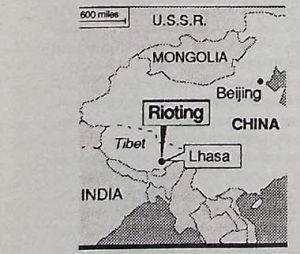
BEIJING: China declaration martial law in the riot scarred capital of Tibet Tuesday during a third day of anti-Chinese has left as many as 50 people dead.
The announcement by the State council, China’s cabinet was a first time such a state of emergency has been declared since anti-Chinese unrest erupted in the series of violent protests in Tibet in October 1987.
The latest violence erupted Sunday after police in Lhasa, the Tibet capital, shot at a small group of Buddhist Monks and nuns protesting for independence from Beijing. It escalated into the worst rioting in the region since March 10, 1959 armed rebellion against Beijing ‘was put down by Chinese troops,
Official Xinhua news agency was reported 12 dead and more than 1 10 Indians in the two days of rioting in Lhasa, but foreigners and Tibetans said as many as 50 were killed and hundreds injured. The Chinese state council has decided to impose martial law on Lhasa, the capital city of Tibetan autonomous region, from midnight tonight (Tuesday), the announcement said.
The order, signed by Premier Li Peng, “is aimed at maintaining social order, protecting the people’s lives and property and preventing encroachment upon public property,” Xinhua said.
It said the rioting is “severely social stability” in Lhasa.
Officials are known to be concerned about further violence on the 30th anniversary of the uprising Friday. Tibet has been tomed since October 1987 by violent protest against Chinese communist rule.
American and other foreign travelers reached by telephone at hotels in Lhasa said more than 100 Tibets, chanting independence slogans and carrying the banned Tibet flag marched again Tuesday on Beijing road a main street in the city center.
There were reports that rioters had again begun setting fires and the police had shot at them, as in the past two days, but those could not be confirmed.
Partners, France and Japan, have asked their oil companies to restrict purchases of Iranian crude oil.
Both the Japanese and French governments have approached their oil companies in an effort to persuade them to curb lifting’s of Iranian oil in the current unavoidable political climate,” said the Cyprus based Middle East Economic Survey.
The reported cutbacks could have a profound effect on Iran’s plans to rebuild its oil industry.
Article extracted from this publication >> March 10, 1989